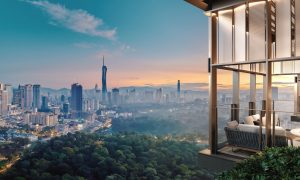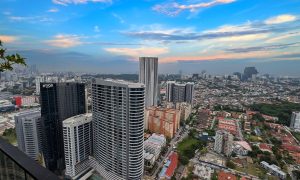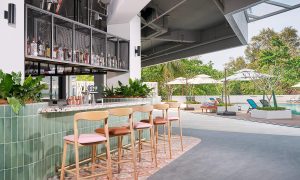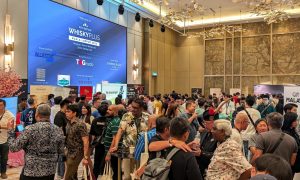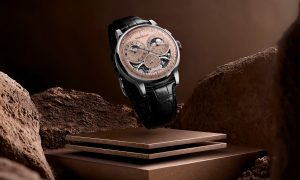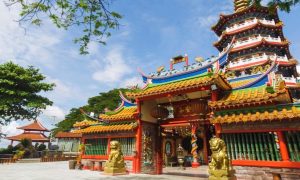Taking to Two Wheels Penang was awash with cyclists before the arrival of cars and traffic jams, but it seems that two wheels are slowly enjoying a revival. Pamela Nowicka took to the saddle to see if a bike-friendly George Town could ever be more than just an idyllic dream.
THERE IS SOMETHING about cycling that evokes freedom, fun, and a sense of possibility. Cycling through George Town, with its compact streets and jewel-like temples, the Chinese shop-houses with their blinds and sun-faded pastel lettering, the scents of the market and traditional herbs drying, is about as good as it gets.
A Poor Man’s Car
For the previous generations living in Penang, the bicycle was a workhorse; the favoured means of transport for all. Then, as housing was built further from the centre and the push of consumerism positioned cars as status symbols, cycling came to be seen as a low status activity, a form of transport only used by poor people who couldn’t afford cars.
For those who tried to remain on two wheels, increased amounts of road traffic meant increased risk. “Before the Penang Bridge was built everyone used to cycle” recalls Queen Lee of Chai di Amma, an eclectic arts and crafts cafe in Queen Street. “Now we are too frightened.”
Queen has a point. Even for someone familiar with cycling in other parts of the world, George Town poses unique challenges, in particular the one-way systems, whose big looping detours and lack of signage are particularly cyclistunfriendly.
Thankfully, things have begun to change, and cyclists are now starting to regain their rightful place on the roads of George Town. Cyclists are no longer despised and side lined but encouraged with initiatives like “Car Free Sunday” and even some new cycle lanes. These changes are welcomed not just by experienced cyclists, but by newbies who would rather not contend with several tonnes of motorised steel when they make their first wobbly forays onto the road.
Tapping the Market
“It’s like a street party, especially in Armenian Street after the George Town Festival, with a map of the murals and sculptures” says Joyce See Kai Xin, who, with husband Lucas Low, runs the cyclist-friendly hostel Tofu in Lebuh Pantai. The hostel offers discounts and free bike rental to hostel guests, and the couple are at the forefront of a new attitude to cycling.
“It’s no longer just for sporty types,” explains Joyce. “The other day I saw a group of eight or nine people with an old lady sandwiched in the middle of them; they’d brought granny too!”
Even the Tourism Ministry is jumping on the bandwagon and has challenged Malaysian businesses to tap the potential of bicycle tourism, with Minister Dato’ Seri Dr Ng Yen Yen recently vowing to “help promote cycling packages under our Cuti Cuti 1 Malaysia and Malaysia Truly Asia promotions.”
In Penang, Ken Khor – who runs Metro Bike Tours – is already ahead of the game. He spotted a gap in the market in 2010 when he saw tourists walking around in the hot sun. “In Penang there are a lot of problems with parking and traffic jams,” he says. “I like heritage and giving talks, and I thought that cycling tours would be a green way of helping tourists.”
With the help of a cycling advocate, Ken devised a circular route which began and ended at Weld Quay. As always happens when cycling is mentioned, dire predictions of risk and exaggerated perceptions of danger were the order of the day. “When we started I was condemned and attacked by people. ‘You’re going to see bloodstains on the road and kill people’ they said.”
Of course, there is a real risk to the cyclist’s life and limbs from car drivers, for whom a millimetre of clearance is deemed ample, but, for Ken, safety is paramount. “We have helmets, hi-vis jackets and PA insurance.”
Two-Wheeling Crowd
Unlike in other parts of the world, cyclists in Penang tend to fall into fairly distinct social categories. At one end of the spectrum are the seasoned cyclists; generally mature, working class people for whom cycling is a means of transport, a cheap and effective means of getting from A to B. Then there are the leisure cyclists, for whom a ride around on two wheels is a convivial form of family entertainment.
Next come the hobbyists who, for some reason inexplicable to a mountain bike rider like myself, are obsessed with the teeny wheeled folding bikes called mini velos. Younger, affluent, and educated, the mini veloists have a popular following among the cognoscenti from KL, Ipoh, and even as far away as Bangkok.
At the more extreme end of the cycling spectrum are the sporty types who use bikes as status symbols, and who revel in “the admiring glances they get on their RM10-20,000 bikes” smiles Tofu’s Lucas Low. “One guy said that when he cycles in his (lycra) cycle suit he gets respect, but when he uses ordinary clothes people think he is a foreign worker!”
Greener Future?
Joyce, Lucas, and Ken are united in their hope that Penang will become the increasingly cycle-friendly and green environment which it richly deserves to be. “Often local people think cycling is impossible, they wouldn’t even think of it,” comments Joyce. “There’s a perception that it’s not safe” agrees Lucas. “Even we’ve had some bad experiences. There’s still a lot to do to promote awareness.” That said, the satisfaction of seeing bike riding neophytes blossom into confident cyclists makes Lucas and Joyce determined to continue to promote enjoyable and safe bike-riding in George Town. “You see people come in with no bike-riding skills. They rent a bike in the morning and by the evening they’re cycling around confidently with a friend,” beams Joyce. “That’s really inspiring!”
Ken Khor is campaigning with a group of cycle activists to extend the car-free zone around the core heritage area in George Town. Already 150 people have signed the petition. “There should be dedicated cycle lanes in George Town. It’s a dream though; it will never happen,” concedes Ken. “Without car parking, the city council would lose revenue.”
Of course the decrease in lives, well-being, or simple economic productivity due to pollution, lack of exercise and road traffic accidents cannot be as easily quantified as parking fees, but those costs and realities are just as real. Plus a landscape dominated by roads and cars is in no way sustainable, tourist-friendly, or green.
“We really hope that people will be willing to share the road with cyclists and that one day it will be taken as something we do daily; using a bike to commute and reduce pollution, not just for leisure,” says Joyce.
“A greener George Town,” agrees Lucas. “I think it will come one day. We have the good example of the older generation.”
———————————————————————————————————
Tofu Café Beds and Bikes, 484 Lebuh Pantai,
George Town; 016.415 0757
Metrobike, 8 Pengkalan Weld, George Town;
019.409 4663; www.metrobike.com.my
———————————————————————————————————
This article was written by Pamela Nowicka for Penang International.
Source: Penang International October-November 2012
Read more:
- Why Do Expats Choose to Live in Penang?
- Wine Pairing with Indian Food; an Impossible Marriage?
- A Preview of the George Town Literary Festival 2012
Register for free on ExpatGoMalaysia.com



